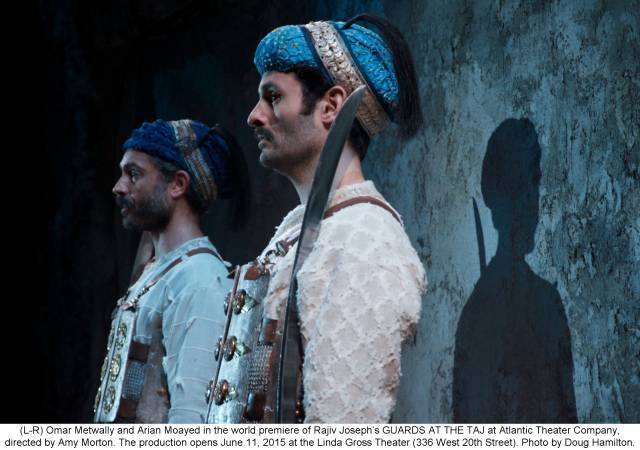
 The close relationship between creation and destruction is at the center of Rajiv Joseph’s provocative Guards at the Taj, which chronicles humanity’s historical need to wreak havoc as the aftermath, or justification, of grand displays of greatness. Set in Agra, India in 1648, the play opens as we meet Imperial Guard Humayun (Omar Metwally), who stands in front of a thick wall, his stern look as impenetrable as the wall behind him. He is soon joined by a disheveled Babur (Arian Moayed) who not only has arrived late to his post, but also won’t stop talking, even if he knows it’s against the rules.
The close relationship between creation and destruction is at the center of Rajiv Joseph’s provocative Guards at the Taj, which chronicles humanity’s historical need to wreak havoc as the aftermath, or justification, of grand displays of greatness. Set in Agra, India in 1648, the play opens as we meet Imperial Guard Humayun (Omar Metwally), who stands in front of a thick wall, his stern look as impenetrable as the wall behind him. He is soon joined by a disheveled Babur (Arian Moayed) who not only has arrived late to his post, but also won’t stop talking, even if he knows it’s against the rules.
Babur quizzes Humayun on the species of the birds that fly above them, asks about the possibility of one day guarding the Imperial Harem (imagines being “surrounded by naked women!”) and then dares to wonder about the marvel that stands behind them; the Taj Mahal. The mausoleum was commissioned by Shah Jahan as the resting place of his beloved Mumtaz Mahal, which until then had only been seen by the people who were building it. As Babur inquires about the urban legends surrounding the beauty of the temple, he slowly incites the reserved Humayun to join in, and as he tells of the emperor’s unique demands, he realizes that they have been appointed there to execute a task of such cruelty that the lights need to be dimmed as we see the two men come to terms with their mission.
When the lights go up things have changed forever, and we are not in the presence of a representation of the Taj Mahal, but of the viciousness that comes with greed, pride and fear. As the two men try to resume their regular lives, they engage in a debate that positions them on opposite ends of the spectrum. As they carry on their menial task, Babur dreams of creating a device that will one day allow him to fly up into the skies and see the Taj Mahal from above; Humayun, inversely, comes up with creations of his own that would present hypothetical failures.
Babur isn’t only a dreamer, but also a man of practical methods. Instead of putting down Humayun for his nonsensical ideas, he tries to give them shape, and find solutions. Humayun therefore begins to fear his companion’s mind, and wonders if his imagination will one day incite him to break all the rules. Joseph cleverly imagines conversations that must at one point or another actually have happened in real life; as the first people dreamed of going up to the sky, others were dreaming only of ways to break their wings and bring them down.
However, Joseph never allows his play to turn into a morality tale, or worse, a condescending study of human nature; instead he poses valid arguments on each side of the battle, and so Guards at the Taj touches on Arendt’s “banality of evil”, as well as more Aristotelian notions about the role of the creator and Freud’s good old fashioned Oedipal issues. The messages are conveyed beautifully by the splendid actors: Metwally, who through Humayun tells a heartbreaking tale of choosing mediocrity over societal exclusion, and Moayed who turns Babur into a being so full of light, that he is constantly blinded by his own brightness.
Elegantly directed by Amy Morton, Guards at the Taj, is a compelling piece of theatre that will surely excite audience members. Some might be disgusted or perplexed by the disturbing mirror it places in front of them - because if anything the play is extremely timely, and one has to sadly acknowledge that it seems to be quite prescient as well - others will undoubtedly be shocked, and most will certainly be entertained (Joseph’s dialogue flows beautifully and the actors give their heart and soul to the performance). The one thing no one will remain is indifferent, and this is exactly what great theatre should do.